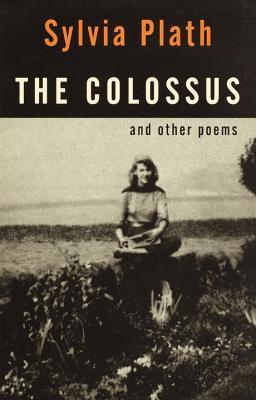
Title: The Colossus and Other Poems
Author: Sylvia Plath
Genre: Poetry; Classics; Fiction
Goodreads Rating: 4.2/ 5 stars
My Rating: 4/ 5 stars
Pages: 84
Publisher: Vintage Books
Published: May 19, 1998 (Original Publication: 1960)
Summary: With this startling, exhilarating book of poems, which was first published in 1960, Sylvia Plath burst into literature with spectacular force. In such classics as "The Beekeeper's Daughter," "The Disquieting Muses," "I Want, I Want," and "Full Fathom Five," she writes about sows and skeletons, fathers and suicides, about the noisy imperatives of life and the chilly hunger for death. Graceful in their craftsmanship, wonderfully original in their imagery, and presenting layer after layer of meaning, the forty poems in The Colossus are early artifacts of genius that still possess the power to move, delight, and shock.
"Blind to what will be and what was
I dream that I am Oedipus.
What I want back is what I was
Before the brooch-pin and the salve
Fixed me in this parenthesis;
Horses fluent in the wind,
A place a time gone out of mind."
Sylvia Plath became a beloved author of mine after I
read her novel, The Bell Jar; a book
that still haunts me after three years. Plath also managed to instill in me, a
love and hunger for poetry. What makes Plath unforgettable, for me, is how raw
her writing is. She wrote from her heart, her soul, and the deepest recesses of
her mind without any regard for how people would receive her work. When an
individual is as authentic and unfiltered as Plath was, that individual has a
story to tell that isn’t triggered by money or fame. Plath could even be regarded
as a twentieth century “tortured artist”; to grasp her work in its entirety the
reader must be able to see Sylvia Plath for who she was, outside of the
spotlight. Plath was the physical embodiment of all that her work represented
and continues to represent.
"Though a mist-wraith wound
Up from the fissured valley and hung
shoulder high
Ahead, it fattened
To no family-featured ghost,
Nor did any word body with a name
The blank mood she walked in. Once past
The dream -peopled village, her eyes entertained
no dream,
And the sandman's dust
Lost luster under her footsoles."
Up from the fissured valley and hung
shoulder high
Ahead, it fattened
To no family-featured ghost,
Nor did any word body with a name
The blank mood she walked in. Once past
The dream -peopled village, her eyes entertained
no dream,
And the sandman's dust
Lost luster under her footsoles."
This collection of poems is an excellent dose of the writing fans have come to associate with Plath: despair over a father's absence; an individual's tango with suicide or suicidal thoughts; ugly truths of life; the simultaneous desire for and fear of love; and the human obsession with death. While I loved the beauty of Plath's flow and the aesthetic her work creates, I was slightly underwhelmed by and left wanting more from the poetry collection. But, there a few poems that I did fall in love with:
- "The Eye - mote"
- "Hardcastle Crags"
- "Lorelei"
- "The Ghost's Leavetaking"
- "The Beekeeper's Daughter"
This would be an excellent introduction to Plath's work for anyone who is unfamiliar with her writing. The Colossus and Other Poems would also make for a wonderful addition to any of Plath's fans' collections of her work. Whether you choose to down this book in one sitting or to read it over a larger span of time, these poems will be worth every second your time and will leave you with a sense of enlightenment.
"The sun rises under the pillar of your tongue.
My hours are married to shadow."
Until next time! Thank you for stopping by! And if you have yet to do so, follow me here on my blog via email subscription to be able to stay informed on when new posts are uploaded.
My social media:
Goodreads
- Anisa

No comments:
Post a Comment